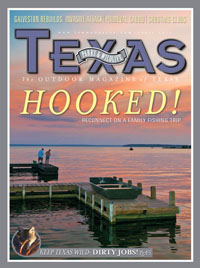
Wild Thing: Playing Possum
Virginia opossums feign death when scare tactics don’t work against predators.
By Sheryl Smith-Rodgers
The credit for naming North America’s only marsupial goes to Capt. John Smith, the legendary leader of English colonists at Jamestown, Va. No doubt, the strange mammal must have perplexed him. “An Opassom,” he penned in 1612, “hath an head like a Swine, and a taile like a Rat, and is of the bigness of a cat.”
Smith — who battled native Algonquian Indians while at Jamestown — likely transliterated our modern-day word of opossum from apasum, which in Algonquian means “white animal.”

Actually gray in color, Didelphis virginiana ranges all across Texas except for extremely dry areas in the Trans-Pecos region. Female opossums, like kangaroos and other marsupials, rear their young in external abdominal pouches. Twice a year (usually February and June), mothers bear from five to 21 embryos, each no bigger than a dime. After birth, the blind babies instinctively crawl into their mother’s pouch, where they must find an available nipple or die (teats rarely number more than 13). As babies nurse, the nipples swell inside their mouths, creating a strong attachment. At 7 weeks old, the young leave the pouch but stick close to mom, still nursing and often riding atop her back.
Solitary by nature, opossums sleep during the day in woodpiles, under buildings, in attics and within abandoned burrows, emerging at night to feed on insects, plants, rats, birds, frogs and carrion (pet food, too!). Their long, furless tails are used for balance and grasping. Opossums may hang briefly upside down by their tails, but they never sleep that way.
Though naturally docile, an opossum will hiss, growl and bare fierce-looking teeth when threatened. If those tactics don’t work, then it may fall limp, drool and look dead to deceive predators. Even if prodded, an opossum feigning death won’t respond; hence that old expression “playing possum.”

